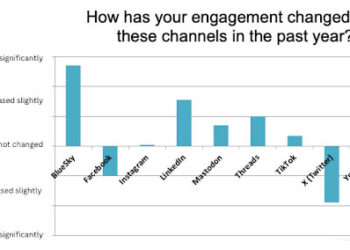
- Image via Wikipedia
Science blogs are a heterogeneous lot, ranging from personal diaries of life in the lab to sites offering technical tips and professional advice, with many stops in between on the hot-button science issues of the day. Different blogs serve different purposes, but one common justification for science blogging is that it can serve as a way for scientists to speak directly with the public, as a tool for engaging non-scientists, keeping them up to date with current discoveries and promoting the enormous value of research.
A recent study in the Journal of Science Communication, however, points out that science blogs are failing to provide this useful service (link found via A.J. Cann, thanks)
Is this really a failure or is it an unrealistic expectation?
Inna Kouper, a graduate student in library and information science at Indiana University, put together an attempt to “initiate a scholarly evidence-based discussion about the role of science blogs in promoting public engagement with science.” To do so, she selected 11 science blogs and tracked their activity during the summer of 2008. A series of quantitative and qualitative analyses were applied to both the posts on the blogs and the comments. While Kouper points out that science blogs are so varied that it’s impossible to pin down “stabilized genre conventions,” she concludes that, in general, they are highly insular to the world of science:
. . . those readers who engage in commenting are almost always associated with science in one way or another. They are graduate students, postdoctoral associates, faculty members and researchers. . . . science blogs are virtual water coolers, where fellow scientists and researchers can virtually get together and talk about “what’s interesting in research topics, what’s up with funding, looking for trends and needs.
There’s nothing wrong with providing an outlet for communication within the scientific community, but, as Kouper notes, there’s a potential here for providing “informed expert and citizen commentary” that is not being realized.
Kouper admits that she’s missing out on non-scientist lurkers, who read but don’t comment, so perhaps more education is happening than she concludes, though that leaves blogs as a one-way medium, rather than as a socially interactive place for conversation between scientists and the lay public.
I’d argue that the insular nature of most science blogging creates barriers that go beyond those mentioned in Kouper’s study that keep non-scientists out, and that they’re likely keeping out a good number of scientists as well. Science Blogs is often referred to as something like a “high school clique.” The Nature Network is regularly seen as a small private club:
Bloggers from this or other platforms comment on other bloggers’ posts, get to “know” one another both online and IRL [In Real Life] in many cases, and in the end, conversing often with a cordial tone. It leads to a club atmosphere . . .
Human nature compels us to seek out like-minded individuals, to bond and form communities. These can be very valuable for scientists, both as a source for information and as an outlet to blow off steam. But it’s likely slowing the growth of science blogging as it cements the image of science blogging as a niche activity. And the in-jokes and snark based on the personalities of the regular clientele sitting around the bar of a blog (or blogging platform) that are impenetrable to all but regular readers are certainly preventing the lofty goal proposed by Nature — that science blogs would fill the void left by science journalism’s decline.
Is that even a reasonable goal? To increase public engagement, Kouper suggests:
Science bloggers need to become more aware of their audience, welcome non-scientists, and focus on explanatory, interpretive, and critical modes of communication, rather than on reporting and opinionating.
In the abstract, this makes sense, but is it realistic? Writing about complex scientific concepts for a lay audience in an entertaining and understandable manner is a rare skill. Having done book acquisitions for a science publishing house for the last decade, I’ve seen a steady stream of well-meaning authors proposing books about their research aimed at a non-science audience. Very few have been able to pull it off. Scientist-authors seem to either assume their readers have an unreasonably high level of background knowledge or they get bogged down in explaining the most basic concepts, taking a tortuous path to get to the actual research they want to discuss (and sometimes both things happen in the same chapter). Writing for a lay audience is not something that’s taught in most Ph.D. programs. Skills can certainly be acquired, but this takes time and practice. It should come as no surprise that many of the science bloggers most skilled at writing for the general public are professional writers, not scientists (see Carl Zimmer or Jen Ouelette as examples).
More importantly, would shoehorning science blogging into an outreach/educational role ruin science blogging? One thing we’ve learned from the development of social media tools is that once created, you can never dictate how those tools are going to be used in the real world. Twitter was originally conceived as a mobile status update service. Its users, however, decided to do something completely different with it, turning it into a far more interesting and useful tool. Science bloggers are doing much the same thing, they’re taking a tool and adapting it to their needs, doing what they want with it rather than forcing their activities to follow someone’s plan for the medium.
The best blogs (not just science blogs) are written with passion and personality. Take away those strongly held opinions and you take away a lot of the fun of reading and writing a blog.
Let’s think of a theoretical world where the wishful thinking of science Web 2.0 advocates has come true, and blogging is now both a required task and something that’s evaluated as part of career advancement. Science bloggers: would knowing that your thesis committee, your tenure committee, your funding agency, and your department chair were reading your blog and factoring this into your professional advancement and continued rate of funding change the way you write your blog? If that career credit were based on the quantity of content aimed solely at education and public outreach, would you enjoy blogging as much as you do now? Would you even want to blog at all under such conditions?
Does institutionalizing a highly personal form of expression destroy its value?
Discussion
19 Thoughts on "Science Blogging as a Public Outreach Tool — Unfulfilled Potential or Unrealistic Expectation?"
Let’s think of a theoretical world where the wishful thinking of science Web 2.0 advocates has come true, and blogging is now both a required task and something that’s evaluated as part of career advancement
Link please, to someone saying it should be required.
Is “required” too strong a word, perhaps an exaggeration? Maybe. It was a hypothetical question after all. But there are certainly advocates who suggest that blogging will become an important and vital, and yes, necessary aspect of being a scientist. Is there a difference between something being “officially required” and something that’s “absolutely necessary”? Some examples:
University professors turn to the blogosphere, for classes and recognition
Ecomomics professor Mark Perry suggests that universities will incorporate blogging into a professor’s responsibilities.
Doing Science Online
Michael Nielsen points to blogging as part of the toolset vital to doing science in the future.
Advancing Science through Conversations: Bridging the Gap between Blogs and the Academy
The authors provide “a roadmap for turning blogs into institutional educational tools.”
Article Level Metrics
PLoS includes blog coverage as one of the metrics for how a scientist’s work will be measured.
I think you’re selling science blogs short.
Yes, the clubby insider blogs are a part of what is being published online about science, but to say that’s all there is is parochial.
I suggest you and Inna Kouper cast your nets wider and you’ll find a lot more than scientists who blog because they’re better at communicating with mice than with people.
As you point out, blogging is a tool to publish without paper and as such can be and is being used in many different ways. In the end, the message is shaped by the writer not the tool. That provides science writers weaning themselves from paper a great opportunity to reach old and new readers.
So I urge you to look beyond the walls of universities to get a better picture of how people writing about science use blogs and the Internet.
Bora Zivkovic gives a detailed analysis of Kouper’s paper here. We seem to be in agreement that directing science bloggers by mandate is somewhat akin to herding cats:
Most blogs are personal blogs. It is the personality of the owner, combined with her/his expertise, that draws in the audience. A personal blog is a personal space for personal expression. Bloggers are likely to strongly resist any attempts by any group to influence the way they spend their free time conversing with friends online. In other words, they are not meant to be vehicles for science engagement with the public by design…
He completes that thought with a suggestion that those individual personalities are why science blogs can be useful for engaging the public:
…but they serve that function very well precisely because of the personality of the blogger, (often self-deprecating) humor, often juicy language, and strong opinions. Scientists are supposed to be cool-headed, anti-social recluses – blogs show they are anything but, break the stereotypes and show the humanity of scientists. With this, comes the trust. And science engagement is all about trust – not the memorization of knowledge of scientific trivia.
“Science bloggers: would knowing that your thesis committee, your tenure committee, your funding agency, and your department chair were reading your blog and factoring this into your professional advancement and continued rate of funding change the way you write your blog?”
I know that *now*. I’ve blogged for a long time (including most of my tenure period), always using my full name. I’ve always known full well that committees, agencies, and individuals can read my blog (and also known how few would be interested).
So nothing would change for me, because those were the conditions I set for myself as I went along.
Anyone blogging under their own name knows that such authorities “could” be looking at their blog, but would it change the way you write if you knew they definitely “were”, and if their interpretation of the blog was part of your evaluation? You might be fine with this, as I’m sure some are, but many would probably change their style in such a case.
Also, would you object to a committee like that putting expectations on your blog, dictating the types of content you create?
“(W)ould it change the way you write if you knew they definitely ‘were’, and if their interpretation of the blog was part of your evaluation?”
No. I have tried to follow the maxim, “Own every word you speak” for a while.
“(W)ould you object to a committee like that putting expectations on your blog, dictating the types of content you create?”
Yes. That, to me, would be the same as them dictating what journals I publish in. I would see that as an academic freedom issue.
My team found that most research related blogs were in fact doing the kind of outreach you describe, at least broadly conceived. They are written by experts for non-experts. What we did not find were more than a handful of blogs being used for scientific communication.
But there has to be a personal interest on the reader’s side, so areas like medicine, climate change, solar power, etc, dominate the technical blogosphere. Climate change has dozens, if not hundreds, of blogs on both sides of the issue, some written by leading scientists. Whether the Hadron Collider will destroy the world is a popular blog topic, one which does not necessarily inspire trust in science.
With the present policy emphasis on science education we may well see more of this sort of outreach blogging. But it will never have the status of scholarly communication of research findings, because it isn’t. So aspiring scholars should not be seen to be putting too much time into it, at the expense of scholarship. There is nothing new about this caution.
I found this wording, “your funding agency” particularly interesting and the noted advocate of Open Notebook Science (and active blogger) Jean-Claude Bradley has some interesting comments here, “Funding Agencies and Open Science” http://usefulchem.blogspot.com/2010/02/funding-agencies-and-open-science.html
I think this discussion could be widened to include not only blogging but the Web presence of scientists in other Web media as well: Open Notebooks, Wiki, etc.
For instance, I am a classic layperson with little scientific background, but I have found Bradley’s blog and those of Cameron Neylon http://cameronneylon.net/
and Steve Koch http://stevekochscience.blogspot.com/
(and keep your eye on him as a test case of how blogging and active engagement in Open Science affect the career trajectory of a young scientist, in his case a biophysicist) to be exemplars of clear, cogent, compelling writing by working scientists that explain complex matters engagingly to those with scant grounding in the sciences.
And David Crotty is himself an example of a scientist who succeeds with non-scientific reading audiences.
I would think that if a potential funder were intrigued by a grant proposal, the ability to, in a second, call up a series of blog posts or an Open Notebook run by the applicant would provide that applicant with a huge edge over other applicants with no such presence. As an organizer of the recent Science Common Symposium I can say that I became aware of many of the speakers we invited to come basically via their work as bloggers and in Open Science projects and only later became aware of their equally strong reputations in mainstream publishing and accomplishments in the lab.
I’m most fond of what happens when a lot of blogs decide to write about an event or a book. They write with different levels of accessibility from different backgrounds, and it gives me a much better picture than if one blog had tried to write one easily-accesible esssay.
We’d see less if everyone tried to sit down and make their work available to the layman but interesting enough for their peers, anyway; that would be work, and not someone dashing to their blog to essentially go “lookit my SCIENCE!!! everyone!” I like reading spillovers of excitement, not hashed-out mini-essays.
And I’m reacting mostly to the idea–I haven’t read the article. But from the sound of it, the article also shortchanges the reader. A layman who’s been following a science blog for a year is going to be getting more out of later posts, and a first-time visitor probably isn’t there to read in-depth anyway; just to get some food for thought and move on.
1. just because the people leaving comments are scientists doesn’t mean there are not any non-scientists reading the blogs.
2. blogs by their very nature will always pander to a mainly scientist (or at least science loving) crowd as they usually have to be sought out. The internet is not like tv or a movie theater where the only show playing is “Science Blogs” or “Science Blogs the Sequel”. The internet is a big place, and only people who have enough of an interest in science are going to regularly check in on science blogs. I wish the public at large were just as interested in science as they are in the drinking and driving habits of Hollywood celebrities, but if Nielson ratings teach us anything, that is simply not the case.
1. Agreed. Kouper directly addresses this in her paper, and it’s noted in the blog entry above, “Kouper admits that she’s missing out on non-scientist lurkers, who read but don’t comment, so perhaps more education is happening than she concludes…”
2. That’s far too reasonable and accurate a statement to make about social media. This is Web 2.0, and apparently you’re supposed to drown everything in unrealistic hype….
![Reblog this post [with Zemanta]](http://img.zemanta.com/reblog_e.png?x-id=07f2fb33-9071-4bc8-a9c2-beb9f8a71413)


